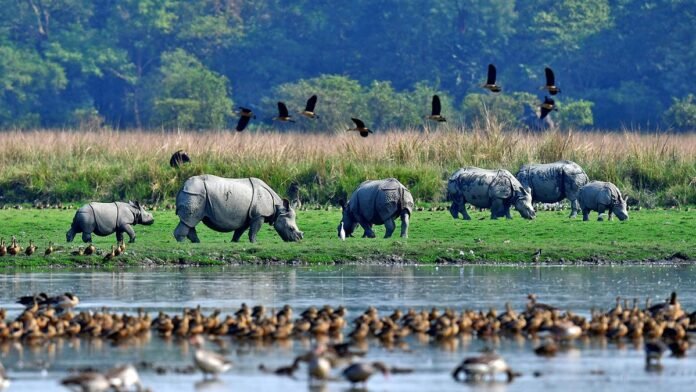The delicate balance between environmental conservation and democratic processes has once again come under scrutiny as the National Green Tribunal (NGT) seeks answers from the Assam government regarding the construction of polling stations within a wildlife sanctuary. This contentious issue has sparked widespread debate, raising questions about the prioritization of electoral activities over environmental protection and the potential impact on fragile ecosystems.
The controversy centers around the recent decision to set up polling stations within the confines of a wildlife sanctuary in Assam. While the rationale behind this move is to facilitate voting access for remote communities living within the sanctuary’s vicinity, environmentalists and conservationists have raised concerns about the potential ramifications for the local flora and fauna.
The NGT’s intervention underscores the gravity of the situation and reflects growing apprehensions regarding the encroachment of human activities into protected areas. The tribunal’s decision to seek the Assam government’s response indicates a recognition of the need to strike a balance between democratic rights and ecological imperatives.
At the heart of the matter lies the clash between two fundamental principles: the right to participate in free and fair elections and the imperative to safeguard biodiversity hotspots and sensitive ecosystems. While ensuring voting access to all citizens is undeniably crucial for upholding the principles of democracy, it should not come at the expense of environmental conservation.
The decision to construct polling stations within a wildlife sanctuary raises several pertinent questions. Firstly, there are concerns about the potential disturbance caused to wildlife due to increased human presence in their habitat. Wildlife sanctuaries are designated as protected areas precisely to provide a safe haven for endangered species and preserve biodiversity. Any intrusion into these sanctuaries, even for temporary purposes such as elections, risks disrupting delicate ecosystems and causing irreparable harm to wildlife populations.
Moreover, the construction of infrastructure such as polling stations within a wildlife sanctuary could have long-term ecological consequences. It may lead to habitat fragmentation, which can hinder the movement of wildlife and exacerbate human-wildlife conflicts. Additionally, the installation of electrical wiring, temporary structures, and increased human foot traffic could result in habitat degradation and pollution, further compromising the sanctuary’s ecological integrity.
The NGT’s intervention serves as a wake-up call for policymakers and underscores the need for a more nuanced approach to the issue at hand. While ensuring voting access to marginalized communities is essential, it should be done in a manner that is environmentally sustainable and minimizes adverse impacts on wildlife and their habitats.
Alternatives such as mobile polling booths, absentee voting arrangements, or establishing temporary polling stations outside the sanctuary boundaries could be explored to balance electoral needs with conservation imperatives. These measures would allow for voter participation without jeopardizing the ecological balance of the wildlife sanctuary.
Furthermore, the Assam government’s response to the NGT’s queries will be closely scrutinized, with stakeholders eagerly awaiting clarification on the rationale behind the decision to construct polling stations within the sanctuary. Transparency and accountability are paramount in such matters, and the government must provide a compelling justification for its actions while demonstrating a commitment to upholding environmental laws and regulations.
Ultimately, the controversy surrounding the construction of polling stations within a wildlife sanctuary underscores the complex interplay between democracy, development, and environmental conservation. It serves as a poignant reminder of the delicate balance that must be struck to ensure the sustainable coexistence of human communities and natural ecosystems.
As the NGT seeks answers from the Assam government, it is incumbent upon all stakeholders to engage in constructive dialogue and seek solutions that prioritize both electoral integrity and environmental stewardship. Only through concerted efforts and a shared commitment to sustainability can we navigate the challenges posed by development while safeguarding the invaluable natural heritage that enriches our planet.


